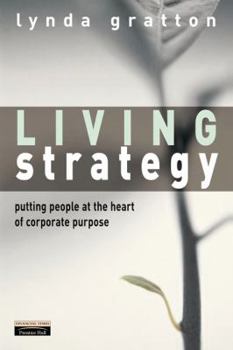Living Strategy
-- Building strategies that don't just get "buy-in", but enthusiastic support, enterprise-wide.-- Powerful techniques for bridging the gap between strategy and human resources.-- Includes detailed... This description may be from another edition of this product.
Format:Hardcover
Language:English
ISBN:0273650157
ISBN13:9780273650157
Release Date:January 2000
Publisher:FT Press
Length:256 Pages
Weight:1.50 lbs.
Dimensions:1.0" x 6.6" x 9.5"
Customer Reviews
2 ratings
What % of people in your organisation really feel inspired?
Published by Thriftbooks.com User , 23 years ago
Ask the question above to managers of an organization and the answer will be "about 15%". According to a study by Lynda Gratton, Author of "Living Strategy", many of us are working in companies where neither our colleagues nor we feel inspired. A 1996 study showed that the percentage ranged between 19 and 8% for companies such as HP, GlaxoWellcome, Citibank, ... Similarly, less than 20% of people feels that the top management is well informed about what people at lower levels think and do. Answers to other questions are better but still: When questioned on integrity, 70% people at the best company of the tested group believed their employer has high integrity, whereas this figure dropped to less than 35% an the least "integer" company of this leading edge research consortium. It's the author's aim to create inspirational companies, which build hope, trust and excitement. When you see the figures above, this clearly is needed. In fact, I discoveed this book when a customer asked me to help them to work on their "integrity".The least this book will do is serve as an eye-opener. Given what I came accross in companies, that by itself is already important. I have to agree with the author that very few companies understand the relationship between increases in revenue and employee emotions.The approach the author presents for "tackling" this enormous task clearly has its advantages over "older" models of managing human resources. However, I recommend to complement this book with messages you'll find in Peter Block's "Flawless Consulting Fieldbook & Companion" and in David Cooperrider's "Appreciative Inquiry: Rethinking Human Organization". In these 2 books you'll find inspiration for better ways of implementing the path Lynda Gratton shows us. For that reason, my rating is limited to 4 stars. Still, you need to buy it to understand the "Why" of the path and to have an additional "drawing".Anyway, start putting people at the heart of corporate purpose!This review was written for the 7EQ.com Newsletter (Vol.4,n°4). Patrick Merlevede is co-author of "7 Steps to Emotional Intelligence"
"People are at the centre of business success"
Published by Thriftbooks.com User , 24 years ago
"My purpose...is simple: to share with you the experiences of three companies (HP, Glaxo Wellcome, and Motorola) and to review the wider body of research which together have convinced me of the prime role of people in organizational success. But that only raises the 'so what' question...so what if people are at the centre of organizational success? I believe that putting people at the heart of organizational success has implications on 'how we think' about organizations and 'what we do' within them. The first part of this book addresses the question of how we think about organizations if we put people at the heart of corporate purpose. For me it raises three basic tenets of being human: we operate in time, we search for meaning, and we have a soul. With this comes a set of nine organizational and managerial capabilities that support these tenets. The second part of the book addresses the question of what we can do to create living strategies that place people at the centre. Over the years I have refined a six-step process that puts people at the heart of corporate success. This, together with the workbook that follows, provides a frame for you to move from this as rhetoric to action-based reality" (pp.3-4).In this context, Lynda Gratton firsty introduces the three tenets and the nine capabilities of new agenda as follows:I. First tenet: we operate in time* Past beliefs, hopes and commitments influence our current behavior: the 'memory of the past'.* Current behavior is influenced by beliefs about what will happen in the future: the 'memory of the future'.* Skills and knowledge take many years to develop.* Human development progresses through a shared sequence.* Attitudes and values are resistant to rapid change.Capabilities:1. Build visionary capabilities.2. Develop scanning capabilities.3. Create strategic capabilities.II. Second tenet: we search for meaning* We strive to interpret the clues and events around us, we actively engage with the world to seek a sense of meaning, to understand who we are and what we can contribute.* Symbols, which may be events or artefacts are important in creating a sense of meaning.* Over time groups of people create collective viewpoints, a sense of shared meaning.Capabilities:4. Develop diagnostic capabilities.5. Create systemic capabilities.6. Build adaptive capabilities.III. Third tenet: we have a soul* Each of us has a deep sense of personal identity of what we are, and of what we believe in.* We can trust and feel inspired by our work-and when we do we are more creative.* We can dream about possibilities and events.* We can choose to give or withold our knowledge-depending on how we feel.Capabilities:7. Develop emotional capabilities.8. Create trust-building capabilities.9. Capability to build the psychological contract.According to Lynda Gratton, to understand 'how' of putting people at the centre of corporate strategy, firstly we must understand 'why' this is crucial






